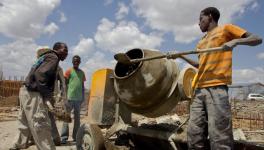The Protest-Resignation of UN Under-Secretary Dr. Rima Khalaf
Here is the Under Secretary describing the report.
DR. RIMA KHALAF: A lot of effort was put into this report, serious scholarly work, and the production of an overwhelming evidence of the nature of the regime that Israel is imposing on the Palestinians. We hope all this will inform further deliberations, on the root causes of the problem, be it within the United Nations or even outside, among member states and within civil society organizations. Also, we hope it will inform and prompt actions to combat an apartheid regime.
SHARMINI PERIES: On to talk about the report, and the resignation of the Under Secretary, is Vijay Prashad. Vijay is the George and Martha Kellner Chair in South Asian History, and Professor of International Studies at Trinity College. One of his books is, "Letters to Palestine: Writers Respond to War and Occupation."
Thank you so much for joining us today, Vijay.
VIJAY PRASHAD: Pleasure.
SHARMINI PERIES: Vijay, give us a sense of why the Secretary General ordered the withdrawal of this report.
VIJAY PRASHAD: Well, the Secretary General said that the report was unacceptable, under immense pressure from the governments of Israel and the United States. That is patently the case. This is not the first time that Rima Khalaf has run afoul of the government of Israel and the United States. In fact, by my count, this is the third report, which has got her into some serious trouble.
The first time, was a report from 2014, which is called, "Arab Integration." This report was pushed back against by the government of Israel and at the time the Israeli ambassador to the United Nations called for her resignation. Ban Ki-moon, then Secretary General, didn't follow the Israeli position and, in fact, he extended Rima Khalaf's term for a second term.
The second time she has come against the government of Israel and other governments in the region, including Egypt and Saudi Arabia, was in January of this year. When she oversaw the production of a very interesting report, which was then entirely suppressed. And that report was a critique of the governments in the region, in terms of their treatment of their citizens.
Now, one would imagine in the aftermath of the Arab Uprisings, and as well the kind of sanctimonious language coming out of Western capitals about dignity and citizens' rights, one would imagine that a report such as that, which criticized governments for their mistreatment of their citizens, would have been welcome, but quite the opposite. The United Nations asked for that report to be entirely suppressed, which it was. It had not released yet.
This report was released. There was a demand, again, to withdraw it, as in January, and which is why in her resignation letter, Rima Khalaf said that, "Twice this has happened to me, and this time I refuse to bend the stick." I think it's quite important to recognize that the United States and Israel haven't - each of these times - discussed the merits or demerits of the report; they have merely tried to suffocate them.
SHARMINI PERIES: Now, here the Under Secretary had some very strong words in her resignation letter, Vijay. What impact do you think this is going to have?
VIJAY PRASHAD: Well, it depends where we're talking about. In the Arab world, she has undoubtedly emerged as a hero. And she has emerged as a hero, I think, for good reason, which is to say Rima Khalaf joined the Economic and Social Commission of West Asia as its head, in 2010, just before the events began in Tunisia. Which set off this new political reality in the Arab world.
So, she has essentially steered the ship. She's been the senior-most United Nations official in the entire Arab region since 2010. And in this period, I think she's done a very good job of bringing intellectual investments into the work of this commission. In other words, each of her reports have drawn from the intellectual capacity of people inside the region, and outside the region, to investigate what's happening.
So, for instance, in the Arab Integration report, the question that was posed is, what is Arabism? Is there such a thing as an Arab? You know, we talk glibly of the Arab Spring, or the Arab Uprisings, and it asked the question: what is an Arab? It asked questions of language, it asked questions of social inequality.
So, she brought a kind of intellectual leadership in the Arab world, which was important. And this intellectual leadership came with a great deal of integrity. You know, refusing to back down, when brought under pressure by the various governments of the region. Not merely Israel, but also the government of Saudi Arabia, and at different parts, other governments, including Egypt.
So, this resignation has shown that she is a person of great integrity, and there's a line in the resignation letter that I think has really touched a chord with people. Where she says that, "I am resigning, not by virtue of my being an international official, but simply by virtue of being a decent human being". I think this idea of a decent human being, is very captivating.
SHARMINI PERIES: Right. And what does this tell us about the new Secretary General, Antonio Guterres?
VIJAY PRASHAD: Well, you know, you can read many things into this. One is, you can say that Mr. Guterres was simply not... he didn't have enough guts to stand up to the Israelis and the Americans. That's a very simple and easy reading. The other is, of course, that he is early into his tenure and didn't want to have a major crisis derail many of his other important concerns. There is a serious problem of a manmade famine in Sudan. There are issues in Syria that will bear a great deal of very delicate kind of footwork.
So, you can also say perhaps he didn't want this crisis falling in his lap at the beginning of his tenure. After all, when Ban Ki-moon came, not to Rima Khalaf's defense - we should not exaggerate what he did in 2014 - but when he refused to ask for her resignation, in fact renewed her term, he had already, in a sense, built up his own position inside the United Nations. So, this may be a matter of timing. But let's also remember that the Trump administration is in power, and is staffed by people with great antipathy to the United Nations.
So, this put everybody, I think, in a difficult position. But certainly, I think Mr. Guterres made a serious error, by asking for that report to be withdrawn. I think what might have been a more, let's say, forthright approach would have been to call for some kind of discussion about the report, about the making of it. Maybe an inquiry of some kind, but he immediately took a political position, and I think that was untenable, as far as the leadership in ESCWA was concerned.
SHARMINI PERIES: All right, Vijay, we're going to follow this story, and hoping to get Rima Khalaf here on The Real News when she's ready to speak to the English media. I thank you today for joining us, Vijay.
VIJAY PRASHAD: Thanks.
SHARMINI PERIES: And thank you for joining us here on The Real News Network.
END
Get the latest reports & analysis with people's perspective on Protests, movements & deep analytical videos, discussions of the current affairs in your Telegram app. Subscribe to NewsClick's Telegram channel & get Real-Time updates on stories, as they get published on our website.
























